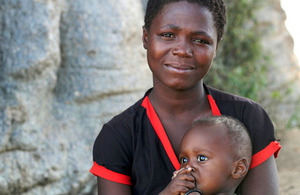DFID contraceptive implant project wins international procurement award
A DFID project expected to save over £162million ($250million) has won Best International Procurement Project of the Year at the CIPS Awards

Women living in remote areas are able to access contraceptives - giving the the power to decide if and when to have a child. Picture: Lindsay Mgbor/DFID
A Department for International Development project expected to save over £162million ($250million) has won Best International Procurement Project of the Year at the CIPS Awards.
DFID and its partners in the Contraceptive Implants Access Programme are working to secure the procurement and provision of traditionally expensive contraceptive implants for 27 million women in developing countries.
DFID beat BAE Systems, BP, EE and the Ministry of Defence to the award.
Working with a consortium of public and private organisations, DFID has secured an agreement that supplier Bayer will reduce the cost by more than half the current US $18 price of its contraceptive implant, Jadelle, in return for a commitment to assure funding for at least 27 million devices over the next six years.
The consortium is made up of the Department for International Development, The Bill & Melinda Gates Foundation, the US, Norwegian and Swedish governments, the Clinton Health Access Initiative, the Children’s Investment Fund Foundation, the United Nations Population Fund and Bayer.
The savings made through the reduction in price will be reinvested in additional procurement and in healthcare systems in the developing world, to provide training in areas such as counselling and high-quality care.
It is estimated the programme will prevent more than 28 million unintended pregnancies, preventing 280,000 infant and 30,000 maternal deaths. Millions more will benefit from the reduced pressures on healthcare, water and other resources.
Lack of choice of a broad range of family planning methods, including implants, was one of the barriers addressed by the London Summit on Family Planning in July 2012, led by the UK and the Gates Foundation. Achieving affordable access to high-priced long-acting, reversible contraceptives was also a key recommendation of the UN Commission on Life-Saving Commodities for Women and Children, who identified a number of barriers to achieving the goal of providing voluntary family planning access to 120 million women and girls in 69 of the poorest countries in the world by 2020. There are currently over 75 million unintended pregnancies every year in the developing world.
This is the first time sovereign and private foundation partners have come together to consolidate volume and improve planning and coordination while using existing procurement processes and logistics infrastructures, paving the way for much-needed future collaborative projects in the international development sector.
Parliamentary Undersecretary of State for International Development Lynne Featherstone said:
Achieving the best value for money is an absolute priority for DFID to ensure our investment secures the biggest impact.
The success of the innovative contraceptive implant project shows what we can achieve when we work collaboratively with partners. By improving access to reliable contraception we are helping to prevent millions of unwanted pregnancies and hundreds of thousands of deaths, and the money saved will help even more people in the developing world.
Notes to editors
- The CIPS (Chartered Institute of Purchasing and Supply) is the leading professional body in the field of purchasing and supply chain management. The annual awards attract strong entries from across the private and public sector. This year’s award ceremony was held on 11 September.
- In addition to the award for Best International Procurement Project of the Year, DFID was shortlisted in the category of Best Contribution to the Reputation of the Procurement Profession.
General media queries (24 hours)
Email mediateam@dfid.gov.uk
Telephone 020 7023 0600
If you have an urgent media query, please email the DFID Media Team on mediateam@dfid.gov.uk in the first instance and we will respond as soon as possible.